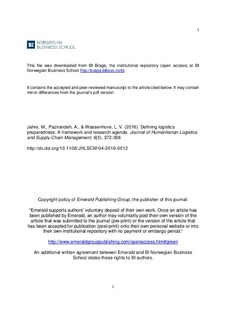Defining logistics preparedness: A framework and research agenda
Journal article, Peer reviewed
Permanent lenke
http://hdl.handle.net/11250/2432984Utgivelsesdato
2016Metadata
Vis full innførselSamlinger
- Scientific articles [2181]
Originalversjon
Journal of Humanitarian Logistics and Supply Chain Management, 6(2016)3, 372-398 http://dx.doi.org/10.1108/JHLSCM-04-2016-0012Sammendrag
Purpose:
The purpose of this paper is to contribute to a more complete understanding of logistics preparedness. By comparing extant research in preparedness and logistics with findings from empirical analysis of secondary data, the authors develop a definition of and framework for logistics preparedness, along with suggestions for future research agenda.
Design/methodology/approach:
The authors link the way in which humanitarian organizations define and aim to achieve logistics preparedness with extant academic research. The authors critically analyze public data from 13 organizations that are active in disaster relief and review papers on logistics preparedness and humanitarian logistics.
Findings:
The authors found that, despite the increased attention, there is no unified understanding across organizations about what constitutes logistics preparedness and how it can contribute to improvements in operations. Based on the review of the academic literature, the authors found that the same is true for humanitarian logistics research. The lack of a common understanding has resulted in low visibility of efforts and lack of knowledge on logistics preparedness.
Research limitations/implications:
On the basis of extant research and practice, the authors suggest a definition of and framework for logistics preparedness with related suggestions for future studies.
Practical implications:
Findings can help the humanitarian community gain a better understanding of their efforts related to developing logistics preparedness and can provide a better basis for communicating the need for, and results from, funding in preparedness.
Social implications:
Results can support improvements in humanitarian supply chains, thereby providing affected people with rapid, cost-efficient, and better-adapted responses.
Originality/value:
The findings contribute to humanitarian logistics literature, first by identifying the issues related to the lack of a common definition. Second, the authors extend the understanding of what constitutes logistics preparedness by proposing an operationalized framework and definition. Finally, the authors add to the literature by discussing what future topics and types of research may be required.
Beskrivelse
The accepted and peer reviewed manuscript
